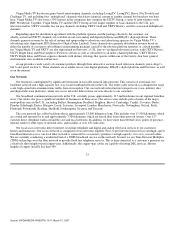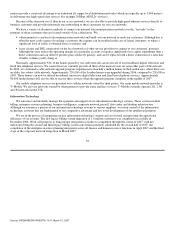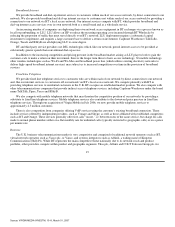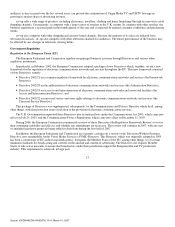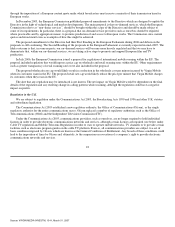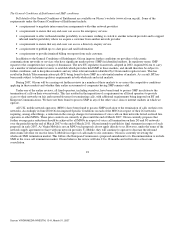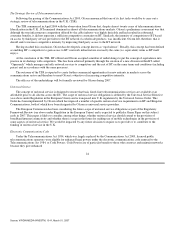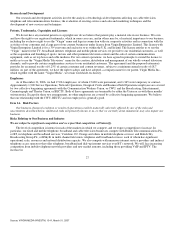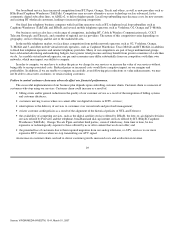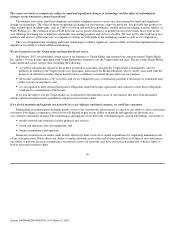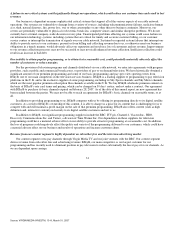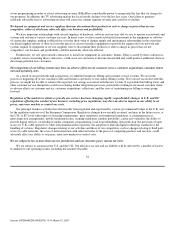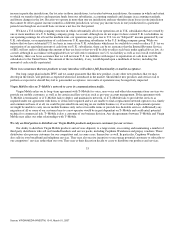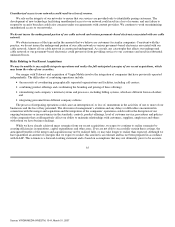Virgin Media 2006 Annual Report Download - page 29
Download and view the complete annual report
Please find page 29 of the 2006 Virgin Media annual report below. You can navigate through the pages in the report by either clicking on the pages listed below, or by using the keyword search tool below to find specific information within the annual report.
legal rights of access to private land, exemption from some requirements of general planning law and the right to install equipment in
the public highway.
The Communications Act 2003 retained the broad structure of Code Powers. Any operator which possessed Code Powers under
the previous licensing regime automatically retained those powers under the Communications Act regime. Any operator wishing to
obtain new Code Powers must now apply to Ofcom. Our subsidiaries that provide electronic communications networks and services
have Code Powers.
Although Code Powers give operators the right to install equipment in public highways, each operator is required to certify to
Ofcom each year that it has sufficient and acceptable financial security in place to cover the costs which could be incurred by local
councils or road authorities if they were required to remove equipment or restore the public roads following the insolvency of that
operator. This security is commonly described as “funds for liabilities.” Ofcom has indicated that it will generally require an operator
to provide board level certification of third party security for this purpose.
Cable TV Regulation
Although we are no longer required to hold individual licenses to provide electronic communications networks and services, we
are still required to hold individual licenses under the Broadcasting Acts 1990 and 1996 for any television channels which we own or
operate and for the provision of certain other services (e.g. electronic program guides) on our cable TV platform.
We therefore hold a number of Television Licensable Content Service Licenses (TLCS licenses) under the Broadcasting Act
1990 for the provision of promotional channels and for the provision of our electronic program guide.
TLCS licenses are granted and administered by Ofcom. The licenses require that each licensed service complies with a number of
Ofcom codes, including the Broadcasting Code, and with all directions issued by Ofcom. Breach of any of the terms of a TLCS
license may result in the imposition of fines on the license holder and, ultimately, to the license being revoked.
Holders of TLCS licenses are required to pay an annual fee to Ofcom. The fees are related to the revenue earning capacity of
each television service and are based on a percentage, set by Ofcom, of revenues from advertising, sponsorship, subscriptions and
interactive services, with special rules applying to shopping channels.
In October 2006, Ofcom commenced a review of the various ways and the terms on which operators of digital TV platforms in
the U.K. (including ourselves) allow access to their platforms for third party TV channel and content providers. This review will
continue throughout 2007. It is not possible at this stage to predict the outcome of this review and whether access to digital TV
platforms in general or to specific platforms in particular, including our cable TV platform, will become more heavily regulated as a
result.
Mobile Telecoms Regulation
The use of radio frequency spectrum is regulated by the Wireless Telegraphy Act 2006 (WTA) and the Communications Act
2003. Ofcom has responsibility for allocating, licensing and regulating the use of spectrum. As Virgin Mobile is not an MNO we are
not directly regulated by the WTA but our network provider, T−Mobile, does (and is required to) have WTA licenses in respect of the
operation of their network.
A new legal and policy framework is being implemented across the U.K. and other member states to fulfill the European
Commission’s objective to effect coordination and harmonization with regard to the availability and efficient use of radio spectrum.
The European Commission has proposed that specific spectrum bands should be subject to tradability throughout the EU and that this
would be supported by
25
Source: VIRGIN MEDIA INVESTM, 10−K, March 01, 2007


